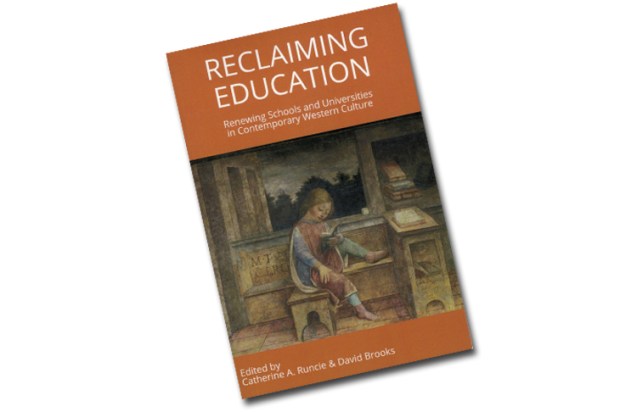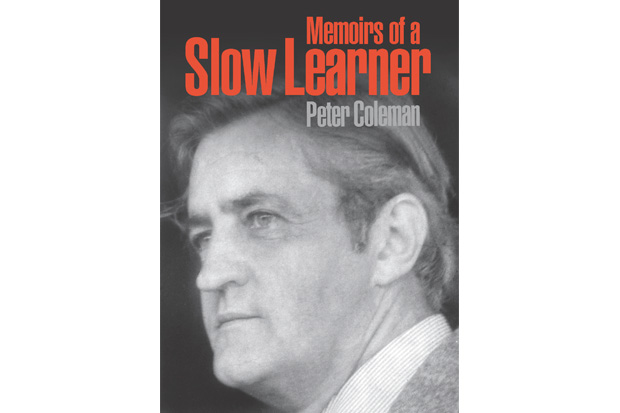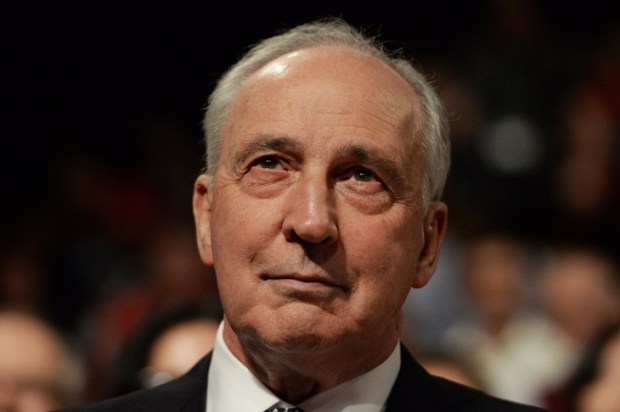It is a measure of Andrew Bolt’s ignominy that it takes a certain courage simply to walk into Dymock’s and buy a copy of his book. Will the bookseller sneer? Will one’s reputation be tarnished by the purchase?
How did Andrew Bolt achieve this pariah status? Quite simply by being right and being Right. It started, Bolt reveals, in his new book – Worth Fighting For – when he began writing columns two decades ago. There were plans to introduce heroin-injecting rooms in Victoria even though evidence from abroad showed that drug overdoses would be likely to increase as a result.
‘It was scary to go against the media pack, the experts and politicians but the facts were clear,’ writes Bolt. ‘Amazingly,’ he says, ‘the sky didn’t fall in.’ Instead, the Liberal government dropped the plan, deaths from heroin overdoses fell and a campaigning columnist got off to a winning start. Since then, Bolt has enraged the Left, not just by slaying their sacred cows but by turning them into hamburgers and eating them with relish.
On border security, for example, Fairfax journalists denounced Bolt as a ‘village idiot’ and ‘a worthless blood clot’ for warning that Prime Minister Rudd would restart the people smuggling trade by reversing the Howard government’s policies. Yet when he was proved right by the tragic drownings at sea and the huge numbers of boat arrivals he was accused of ‘distasteful triumphalism’.
Indeed, Greens leader Bob Brown called on Bolt to resign saying Bolt had ‘blood on his hands’ because he had ‘stridently insisted on the invasion and killings in Iraq which led to millions fleeing’, some of whom, Brown claimed, had drowned off Christmas Island. That Bolt should then call for Prime Minister Gillard’s resignation while bodies were still in the ocean ‘lacked human decency’ Brown said.
It is all too obvious that it was the Labor government’s policy, eagerly championed by the Greens and left-leaning commentators, that had led to the 1,200 deaths at sea, and eventually the policy was repudiated by Labor, but with no acknowledgement to Bolt of course, that he had been right.
Bolt’s relationship with Labor is revealing. The journalist worked for the Hawke government on two election campaigns. That Bolt is now reviled by so many Labor politicians is a measure not of how much Bolt has moved to the Right but how far Labor has been moved to the Left by middle class activists who despise the values of ordinary Australians.
Bolt guiltily confesses that he liked to tune into the ABC on Sunday mornings on the way to record his Bolt Report for the Ten Network, because he’s a fan of Australia All Over which connects him to the Australians he’s sticking up for – the early risers, the slow talkers, the hard workers, who feel glad about a new day and excited about what can be done with it.
The demonisation of Andrew Bolt is, by extension, the demonisation not just of his many readers but of ordinary Australians who are constantly berated as racist, sexist, misogynist, violent, militaristic oiks.
Yet as Bolt points out, Australia is so much better than its self-loathing critics allow. His columns celebrate have-a-go heroes and readers who help fulfill the wishes of a dying child, those who honour our soldiers on Anzac Day for fighting for our freedoms and those who embrace the melting-pot ethnicity of the winners of MasterChef and Australian Idol, giving the lie to the slur that Australians are irredeemable bigots.
Bolt delights in skewering pampered moralists who indulge in finger wagging from First Class, raising awareness of their superior virtue rather than helping others. He takes pleasure in puncturing a cavalcade of poseurs – celebrity activists, hashtag slacktivists, global warming alarmists, race industry professionals and foul-mouthed ABC personalities. But, as Bolt reminds readers, the moral posturing comes at a high price for the poor, since it supports dangerous policies which waste scarce taxpayer dollars, foment racial division and leave vulnerable children in homes where they are neglected, abused, even murdered.
One of the great merits of the book is that Bolt’s columns are organised according to themes and pick up on the evolution of debates over many years from the threats posed by Koori courts and sharia law, to late-term abortion and euthanasia, from the stolen generation and the fabrication of Aboriginal history, to dud climate change predictions, from gay marriage and the slippery slope to Muslim polygamy, to Islamist violence and refugees.
Given the bitterness of the culture wars, it’s a surprisingly enjoyable trip through the trenches. Bolt writes with passion and humour, mocking himself and exposing his flaws and foibles. With all that, he has an impressive strike rate. No, the planet hasn’t warmed in the apocalyptic way that was predicted. No, thousands of children weren’t stolen simply because they were Aboriginal. Yes, those who perpetrated Islamist atrocities came here as Muslim refugees.
But Bolt has disquieted some even in the News Corps camp. Bolt’s opposition to the recognition of Aboriginals in the constitution led a former editor of the Australian to say he was spreading ‘poison’ with his ‘extreme’ ‘xenophobic’ position. But Bolt asks, ‘If I must be silenced, what must be done to millions of other Australians equally appalled by these attempts to divide our country on the bloody fault lines of race?’
Bolt, and News Corp, have been made to pay for speaking out, most clearly illustrated when Bolt was taken to court for breaches of Section 18C of the Racial Discrimination Act for articles he wrote about fair-skinned Aboriginals. The punishment was not just the costs, which would bankrupt an individual, but the gruelling court process and the jeering of the elites. Bolt was put in the stocks as a warning to others. Yet, as George Orwell wrote, ‘If liberty means anything at all, it means the right to tell people what they do not want to hear.’ For that reason, more than any other, Worth Fighting For is a must-read account of the key debates in contemporary Australia.
The post Slaying sacred cows appeared first on The Spectator.
Got something to add? Join the discussion and comment below.
Get 10 issues for just $10
Subscribe to The Spectator Australia today for the next 10 magazine issues, plus full online access, for just $10.
You might disagree with half of it, but you’ll enjoy reading all of it. Try your first month for free, then just $2 a week for the remainder of your first year.












Comments
Don't miss out
Join the conversation with other Spectator Australia readers. Subscribe to leave a comment.
SUBSCRIBEAlready a subscriber? Log in